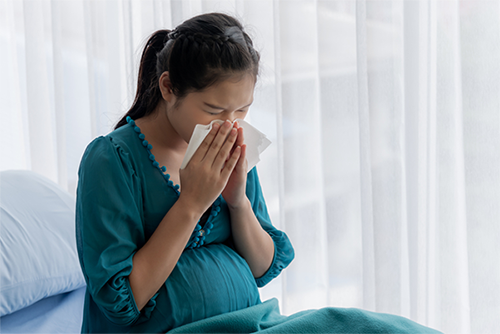
The Benefits of the Flu Vaccine From Baby to Lola
The benefits of the flu vaccine go beyond avoiding a few days of fever or cough. For many families in the Philippines, getting vaccinated can mean preventing a trip to the hospital or worse.
According to the Philippine Statistics Authority, pneumonia is the fourth leading cause of death in the country. And one of the common causes of pneumonia? The flu.
The good news is the flu vaccine remains one of the most effective ways to prevent illness and stop the spread of the virus, especially in homes with pregnant women, children below 5 years old, or elderly family members.
The Benefits of the Flu Vaccine for Babies and Kids
Your child may seem healthy and active, but their immune system is still developing. Babies, toddlers, and preschoolers are more likely to become severely ill from the flu compared to adults. Here's how the flu vaccine helps babies and young kids:
1. Cuts trips to the emergency room
A 2024 study in JAMA Network Open looked at children from 6 months and up who experienced severe influenza between 2015 and 2020.
Researchers found that getting the flu vaccine helped protect kids from becoming seriously ill with the flu, regardless of the severity of their symptoms.
The study also showed that receiving at least one dose of the flu vaccine resulted in a decrease of over 50% in visits to the emergency department or hospitalizations due to the flu.
2. Protects against serious complications
Aside from pneumonia, one of the most severe flu complications in children is acute necrotizing encephalopathy (ANE), a condition that causes brain swelling.
ANE is considered rare. But during the 2024–2025 flu season, pediatric hospitals in the US reported a rise in ANE cases linked to influenza, prompting Stanford Medicine to investigate.
The results, published in JAMA in July 2025, identified 41 confirmed cases: 27% of affected children passed away, and 63% of survivors faced moderate to severe disabilities (like being unable to walk) three months later.
The doctors behind the study emphasized that flu vaccines are one of the most effective ways to reduce the risk of ANE.
3. Helps protect younger siblings
Even if your baby isn't old enough to be vaccinated, ensuring that older siblings receive their flu vaccine can create a protective barrier at home.
Flu spreads easily through the air, and people with the flu can spread it to others up to about 6 feet away. It can pass from one person to another through coughing, sneezing, or even touching shared items like remote controls, toys, or doorknobs.
Dr. Tricia Ramos, DPPS, a trained ambulatory pediatrician and pediatric primary care specialist, recommends administering the flu vaccine starting at 6 months of age.
She adds, "During the first year when the flu shot could be given, children need two doses given four weeks apart followed by annual doses until they’re 18 years old."
The Benefits of the Flu Vaccine for Pregnancy

One of the practical benefits of flu vaccine is helping you avoid high health costs, from hospital bills to time off work.
Getting the flu vaccine during pregnancy does more than protect you from getting sick. It also helps protect your baby, both before and after they're born.
Here's what the flu vaccine can do for you and your baby in the womb:
4. Reduces your risk of getting the flu
Pregnancy naturally changes how your body works, including your immune system. That's why pregnant women face a higher risk of getting seriously sick from the flu, according to the National Foundation for Infectious Diseases (NFID).
Studies have shown that getting the flu shot during pregnancy can reduce the risk of contracting the flu by up to 50%. The US Centers for Disease Control and Prevention (CDC) adds that the vaccine also reduces the risk of hospitalization due to flu by an average of 40%.
5. Lowers the risk of preterm birth and low birthweight
A 16-year study in New Zealand, published in Influenza and Other Respiratory Viruses, helps explain why flu protection is so crucial during pregnancy.
Researchers looked at more than 800,000 pregnancies and found that those who were hospitalized for respiratory illness during flu season had a higher risk of preterm birth and low birthweight. But getting a flu vaccine during pregnancy reduced those risks. The vaccine was also linked to a lower risk of fetal death during flu season.
6. Passes antibodies to your baby in the womb
Your body makes flu-fighting antibodies after you get vaccinated, and these antibodies are passed on to your baby during pregnancy. After they're born, the antibodies are then shared with your baby through breast milk, according to the CDC.
The American College of Obstetricians and Gynecologists (ACOG) notes that large-scale randomized controlled trials and numerous small studies have demonstrated that receiving a flu vaccine during pregnancy can help protect newborns from the flu.
The Benefits of the Flu Vaccine for Older Family Members
Older folks aged 65 and up are part of high-risk groups because they're more likely to face serious complications from the flu compared to younger, healthier adults. Here's how the flu vaccine helps them:
7. Helps prevent ICU admission
A 2023 study in the journal Vaccines found that flu shots helped prevent nearly 10,000 hospitalizations and more than 1,500 ICU admissions every year in adults aged 65 and older.
Even in seasons when the flu vaccine wasn't a perfect match to the circulating strain, the study showed it still prevented around 40% of ICU admissions and up to 26% of hospitalizations in seniors.
8. Prevents severe outcomes
A simple flu infection in an older adult can quickly turn into a serious complication, from dehydration to pneumonia.
A 2022 study in The Lancet Global Health, which included participants from the Philippines and other countries in Asia and Africa, followed over 5,000 adults with heart failure to see whether getting a flu vaccine could lower their risk of serious outcomes.
Researchers found that, although the benefits weren’t always statistically significant throughout the entire study period, the vaccine helped prevent complications that required hospitalization. In fact, it cut the risk of community-acquired pneumonia by 42%, one of the more serious outcomes that can follow a bad case of the flu.
9. Protects those with heart disease
For people over 65, NFID states that the flu can increase the risk of a heart attack by three to five times and stroke by two to three times during the first couple of weeks after getting sick. That risk stays higher for months after.
According to the World Heart Federation, flu vaccination can reduce the risk of heart attacks up to 45%.
Flu Vaccine Basics for the Whole Family

Getting vaccinated serves as family protection.
Whether you’re getting the flu shot for yourself, your child, or an older family member, it helps to know what to expect. Here are quick answers to common questions about timing, protection, and what to do after receiving the vaccine.
How long does the flu vaccine's protection last?
Protection usually lasts about six months. Since the flu virus changes regularly, a person or child needs to get a flu shot every year to protect against the strains expected to spread.
When is the best time to get a flu shot?
The best time to get a flu vaccine is just before the flu viruses start spreading widely and respiratory infections spike. In the Philippines, Dr. Ramos notes, the rainy season, which typically begins in July, coincides with peak flu season.
"Ideally, the child receives the flu shot between February to June in order to boost the body's immune system before the number of flu cases rise."
Pregnant women can receive the vaccine at any trimester. NFID states that it takes approximately two weeks after vaccination for your body to develop protection against the flu.
What to avoid after a flu vaccine?
You can go about your usual day after getting the shot. For children, make sure your child gets plenty of rest, liquids, and nutritious food.
Dr. Ramos says children may experience side effects, such as soreness at the injection site, fever, and flu-like symptoms.
"These side effects should resolve on their own within 24-48 hours. I do advise parents to contact their clinic if symptoms persist or if the child feels unusually ill."
Dr. Ramos adds, "Try not to give your child anti-inflammatory medicine such as ibuprofen. It might interfere with the immune response. It's best to consult with your pediatrician before taking any medication after receiving the shot."
The Bigger Picture
Getting a yearly flu shot is a simple way to protect the family from the worst effects of the flu. It helps reduce a child's risk of getting seriously sick, supports a safer pregnancy, and lowers the chances of hospital visits for older adults and people with health conditions.
Plus, the benefits of the flu vaccine extend to the whole community. When more people are vaccinated, it helps reduce the spread of the virus and protects people who are too young or too weak to fight off the virus on their own. A flu shot is a simple step that can make a big difference in many lives.
How has your family enejoyed the benefits of the flu vaccine? Share it on the ParentTeam Moms and Dads Facebook Group!









